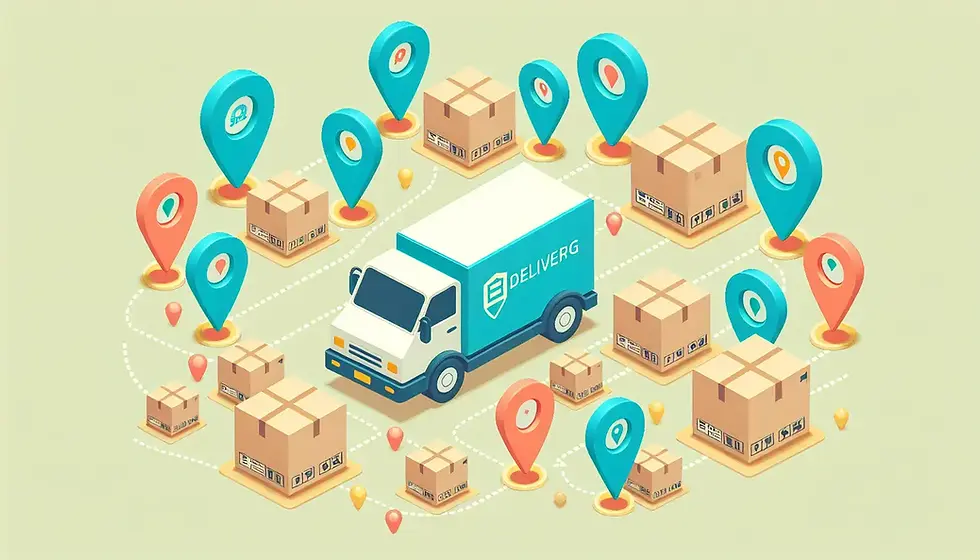How ecommerce Logistics Can Boost Your Business Efficiency
- May 19, 2025
- 4 min read
In today's fast-paced online marketplace, the efficiency of your ecommerce logistics can be a game-changer for your business. Navigating the complexities of logistics with a strategic approach not only saves time but also enhances customer satisfaction, ultimately boosting your business's performance. In this blog, we'll explore the essential elements of ecommerce logistics and how they can significantly elevate your operational efficiency.

Understanding the Basics of Ecommerce Logistics
Ecommerce logistics encompasses the processes involved in managing the transportation, warehousing, and delivery of products sold online. From order fulfillment to inventory management, understanding these basics is crucial to building an efficient logistics strategy.
The foundation of ecommerce logistics lies in its ability to efficiently manage various components such as supply chain operations, transportation, and last-mile delivery. These processes are interconnected, making it essential to understand each one to avoid common pitfalls and maximize efficiency. By gaining a thorough understanding of these components, businesses can create a cohesive strategy that promises timely deliveries and happy customers, setting a solid groundwork for growth.
A practical approach to ecommerce logistics involves recognizing its pivotal role in enhancing customer experience. Imagine the disappointment of a customer who eagerly awaits their package only to face unexpected delays or misdeliveries. To mitigate such issues, businesses must invest in robust logistics solutions. By integrating customer feedback loops and refining order tracking systems, businesses can ensure a smooth and trustworthy shopping experience.
Key Components of an Efficient Logistics System
A robust logistics system isn't just about moving products from point A to point B. Key components include inventory management, order fulfillment, shipping, and delivery. Streamlining these components ensures that your operations run smoothly and your customers receive their products without delay.
Inventory management stands as a cornerstone of logistics efficiency. With the advent of real-time inventory tracking, businesses can not only track stock levels accurately but also predict future demands, thus avoiding stockouts or overstocking scenarios. This capability ensures optimal use of warehouse space and resources, reducing waste and saving costs in the long run.
Order fulfillment strategies play a decisive role in logistics performance. By adopting smarter warehouse layouts and implementing automated picking systems, businesses can significantly reduce order processing times. Automated systems coordinate the real-time flow of goods within warehouses, leading to faster packing and shipping. Furthermore, a strategic choice of shipping partners can enhance delivery speed and reliability, contributing to an overall enhanced customer satisfaction.
Leveraging Technology for Streamlined Operations
Incorporating technology into your logistics processes can dramatically improve efficiency. Tools like inventory management software, automated order processing, and real-time tracking systems enable businesses to handle logistics with greater precision and speed.
One of the primary benefits of technology is the ability to gain insights from big data analytics. By analyzing patterns in customer purchases and preferences, ecommerce businesses can optimize their logistics networks. For instance, by predicting peak demand periods, companies can adjust their supply chain accordingly, preparing for spikes in orders and thereby preventing delays and improving customer satisfaction.
Embracing automation in ecommerce logistics is not just a trend but a necessity in today's digital age. Automated systems for warehousing and shipping streamline operations, allowing for faster order cycles and reduced human error. These systems can improve the allocation of resources, enhance accuracy in inventory management, and lead to increased throughput without necessarily expanding physical space.
The Role of Third-Party Logistics Providers
Partnering with third-party logistics (3PL) providers can offer a flexible and cost-effective way to enhance your logistics capabilities. 3PLs bring expertise and scale, allowing businesses to focus on their core competencies while ensuring efficient and reliable logistics operations.
The decision to engage a 3PL provider can be transformative. These partners bring not just logistics expertise but also access to advanced technologies and systems that might otherwise be inaccessible to smaller companies. Consequently, businesses can enjoy the benefits of a seamless logistics operation without the associated capital expenses. This partnership enables businesses to pivot more quickly and focus resources on growth initiatives like marketing and product development.
Strategically aligning with 3PL providers also allows businesses to scale operations up or down according to market demand. For example, during high-demand periods such as holiday seasons, 3PLs can manage increased shipping volumes efficiently, ensuring customer satisfaction does not wane. Moreover, they offer geographical reach, extending your delivery capabilities to areas that may have been logistically challenging otherwise.
Best Practices for Boosting Logistics Efficiency
Implementing best practices such as continuous process evaluation, utilizing data analytics, and fostering strong supplier relationships can lead to significant improvements in logistics efficiency. These practices not only streamline operations but also provide valuable insights into further optimization opportunities.
Regularly revisiting and refining your logistics process can reveal inefficiencies. With process automation tools, businesses are equipped to reanalyze their logistics workflows, identifying bottlenecks or redundancies that can be streamlined. Such evaluations can result in cost savings and improved service levels, ensuring logistics operations remain competitive and responsive to market changes.
Maintaining strong relationships with suppliers is also pivotal in logistics efficiency. By establishing open channels of communication with suppliers, businesses can ensure a smoother flow of goods, warding off potential disruptions. This practice, coupled with regular performance reviews and cooperation on joint improvement plans, fosters an environment of trust and reliability that benefits the entire supply chain.
Enhance Your Business Efficiency with Streamlined Ecommerce Logistics
By optimizing your ecommerce logistics, you lay the groundwork for enhanced efficiency, improved customer satisfaction, and business growth. As you refine your logistics strategies, you'll find that a seamless and efficient operation not only helps in retaining customers but also in setting your business apart in a competitive market. Embrace the power of well-structured logistics and watch your business efficiency soar.



Comments